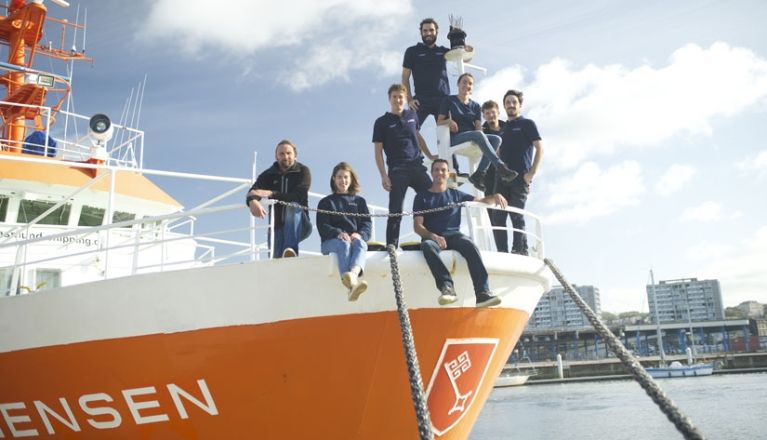Plastic Odyssey and Crédit Agricole: stopping plastic pollution at source
Happy he who prepares to head for the high seas – like Simon Bernard, former officer in the merchant navy and head of the Plastic Odyssey expedition. Like Ulysses who faced many challenges on his journey home to Ithaca, the crew of Plastic Odyssey is not setting out on a leisurely cruise.
The aim? Make current recycling techniques available around the world. On board his ambassador ship, Simon and the team will share best practices, adding to them and deepening knowledge at each stopover. The aim of this particular odyssey is to promote the development of small entrepreneurial initiatives around the recycling of plastic waste. The initiative is supported by the Crédit Agricole Group and the Grameen Crédit Agricole Foundation.

A team of “observers and ambassadors”
Concerned by the scale of plastic pollution in our oceans (microplastics for the most part, which are invisible to the eye), Simon Bernard set out to do something about plastic waste. He put together Plastic Odyssey, a three-year expedition with some 30 stopovers. His quest? Promote recycling and prevent plastics ending up in the ocean. Leaving from Marseille, the vessel will cross the Mediterranean from the west of Africa to South America, the Pacific, Asia and the east coast of Africa. It will visit the three most polluted continents with the least effective technologies to process plastic waste. The expedition’s approach is based on learning and sharing through entrepreneurship: learn, observe, listen to local stakeholders and understand their cultures to share good ideas and attempt to introduce recycling techniques that have proven their worth in other countries, adapted to the local context.
----------------------------------
Preparing to set sail
In dock for a few more weeks while renovation work is done and recycling units are installed to convert plastic waste into fuel, the Plastic Odyssey ship will set sail next January. The expedition will navigate in the Mediterranean between January and June 2021, with ports of call in Lebanon, Egypt, Tunisia, Algeria and Morroco. The Crédit Agricole Group is a founding partner and one of the driving forces behind the expedition. Deeply committed to the environmental and entrepreneurial project, Philippe Brassac and Raphaël Appert, together with three other senior managers*, paid a visit to the ship at Boulogne-sur-Mer at the beginning of the year.
* Jean-François Abadie, CEO of CACEIS; Jean-Bernard Mas, Senior Country Officer, Crédit Agricole Poland and CEO of Crédit Agricole Bank Polska; and Serge Gaona, Deputy CEO of the Alpes Provence Regional Bank.
[WATCH THE VIDEO]
----------------------------------
Multidimensional backing from the Grameen Crédit Agricole Foundation
Drawing on its expertise in promoting positive social impact and inclusive entrepreneurship, combined with its knowledge of the field gained from its presence in nearly 40 countries, the Grameen Crédit Agricole Foundation is committed to working alongside Plastic Odyssey. Its objective is to facilitate connections between the Plastic Odyssey and local networks with the capability to adopt new recycling techniques. The Foundation will organise contacts with local recycling networks and industries, provide assistance and advice to map out smart projects that can be replicated from one port of call to another, and organise meetings with big players in local industry to help set up small pilot units to develop local social business models.
----------------------------------
Why is Plastic Odyssey fuelled by plastic waste?
Plastic Odyssey’s mission is to showcase what can be done with recycling technology, not to clean up the ocean – contrary to what you might have read here and there. Using open source and low-cost technology, the ship will show all stages in plastic recycling: sorting, cleaning, grinding and heating at high temperature (pyrolisis). The team will also demonstrate how to convert plastics to fuel. This Odyssey’s aim is not to develop new techniques, but to demonstrate existing solutions that are affordable and replicable at each port of call.
The underlying principles are low tech, simplicity, practicality, affordability and popularity.
----------------------------------
Crédits photos : PlasticOdyssey, Valentin Proult, Laurent Lachèvre
Sources : Ministère de transition écologique et solidaire






